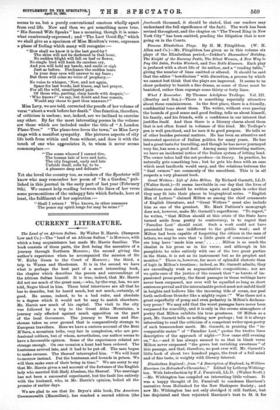Great Writers : Life of John Milton. By Richard Garnett,
LL.D. (Walter Scott.)—It seems inevitable in our day that the lives of illustrious men should be written again and again in order that they may fit into their places in biographical series. "English Men of Letters" claimed Milton as among the chief ornaments of English literature, and "Great Writers" must also include him as one of the greatest. Mr. Mark• Pattison's monograph does not, however, make Mr. Garnett's superfluous. "To regret," he writes, "that Milton should at this crisis of the State have turned aside from poetry to controversy, is to regret that
Paradise Lost' should exist. Such a work could not have proceeded from one indifferent to the public weal ; and if Milton had been capable of forgetting the citizen in the man of letters, we may be sure that 'a little grain of conscience' would
ere long have made him sour' Milton is as much the idealist in his prose as in his verse ; and although in his pamphlets he sides entirely with one of the two great parties in the State, it is not as its instrument but as its prophet and monitor." There is, however, far more of splendid rhetoric than of logic in Milton's treatises ; indeed, as Mr. Garnett admits, they are exceedingly weak as argumentative compositions ; nor are we quite sure of the justice of the remark that "as bursts of im- passioned prose-poetry, the finest passages in these writings have never been surpassed, nor ever will be equalled so long as short sentences prevail and the interminable period must not unfold itself in heights and hollows like the incoming tide of ocean, nor peal forth melodious thunder like a mighty organ !" Was there not a great superfluity of pomp and even pedantry in Milton's declama- tory prose ? We may add that the worst passages have never been surpassed for scurrility, and it is only in the serene atmosphere of poetry that Milton exhibits his true greatness. Of Milton as a poet, Mr. Garnett tells us nothing new perhaps ; but it is always interesting to read the criticism of a competent writer upon poetry of such transcendent merit. Mr. Garnett, in praising the "in- comparable able metre " of "Paradise Lost," quotes the twelve lines descriptive of the approach of night—" Now came still evening on," &c.—and it has always seemed to us that in blank verse Milton never surpassed "the grave but ravishing sweetness" of this passage, and that, therefore, no poet ever will. Mr. Garnett's little book of about two hundred pages, the fruit of a full mind and of fine taste, is weighty with literary interest.


















































 Previous page
Previous page